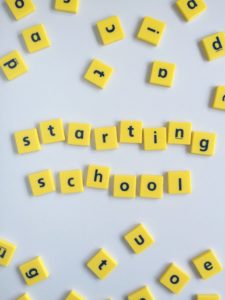Transition to School
Moving on to Primary 1
Starting school is one of the biggest milestones in childhood, for children and their families.
It’s a time of excitement, when children can look forward to new adventures, challenges and learning. As with any change there can be worries too, wondering what will happen at school and if everything will be okay.
At Arthurlie Family Centre we work closely with our local school community to provide transition activities which support children and families during the whole process of starting school.
Our transition programme will begin in May, when school places have been confirmed. Transition conversations are held with each school, when we discuss each child with the teacher, and all relevant information about strengths, interests and friendships is shared. There will be Playtime groups each week so that children can meet others going to the same school, and teachers from the school will visit for two of these sessions. Staff will plan different play activities to help children prepare for starting school.
In May/June your school will invite you and your child for two induction visits when you can meet some staff and visit the primary 1 classes.
Dates and times are shown by clicking the link below however you should check these with recent information from your school
School Transition Dates 2023
During the week of 12th June you will be invited to attend your child’s Moving On ceremony at Arthurlie Family Centre to celebrate moving on to Primary 1. Further details of dates and times will follow.
Frequently asked Questions
I’m worried that sometimes my child loses interest in writing letters and numbers – I’m not sure what they should be able to do at this stage.
Every child learns at their own pace, so children in Primary 1 will have a wide range of abilities and skills.
Writing skills: Learning to write needs lots of different muscle skills, hand to eye co-ordination and control, as well as a motivation and purpose, so there are many ways to help your child practice the skills needed.
Developing fine motor skills through play gives children the hand movements needed to be able to hold and control a pencil, so lots of games with playdough, small construction such as Lego, using scissors, spades, using paintbrushes and so on are great for this. Big motor movements, such as running and jumping, swinging arms etc. help to develop core muscles so children can sit comfortably and give their attention to a task such as writing. Providing writing and drawing materials that children can choose to use as they wish will provide practise for your child. Copying letters and numbers is not the main priority – making marks, scribbles, making squiggly patterns and drawing will help your child improve. Reasons to mark make, such as birthday cards, making lists or writing during play, can help to engage children in writing.
We want children to have a really positive view of their skills and feel confident about their writing, so it should be fun and interesting. Doing a little, often, can be better than asking your child to copy letters or numbers for longer periods of time.
My child is upset every time we talk about school/I’m worried about how my child will settle at school – they took a long time to settle at nursery or when meeting new people.
Talking to your child will provide lots of reassurance to them if they are anxious about starting school. Walking past the school and stopping to talk about it can help your child to voice particular worries. Talk about each part of a school day, to try to find out anything that is troubling your child. When you are talking together you can reassure your child about who can help them at school too.
I’m not sure what will be expected in terms of independence.
Adults in school will be available to assist children, however being independent is part of developing skills for life and should be encouraged for their own self esteem. At home and in nursery provide opportunities for your child to:
- Change outdoor to indoor shoes
- Successfully using the toilet on their own
- Putting a jacket on or taking it off, making an attempt to use the zip or other fastenings
- Children should practice to change their own clothes in preparation for gym days
- Opening and closing their schoolbag and lunchbox
- Opening water bottles and other packaging which will assist them at snack and lunchtime
Will my child have friends in their class?
Children who transfer to our catchment schools will know children from nursery. Arthurlie teachers discuss friendships with schools during transition conversations to make sure each child will recognise familiar children from nursery.
If you have a particular request please send an email to us at: schoolmail@arthurlie.e-renfrew.sch.uk
The links below provide useful information for parents:
Parentclub
https://www.parentclub.scot/child
Healthier Minds
Parentzone
